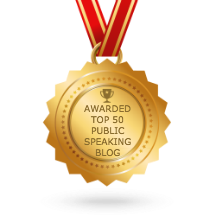Beverly Dracos, a writer for business communications and owner of Genuine Communications.com, astonished me with her understanding of the use of words “authenticity” and being “genuine.” Bev loves language and has made a serious study of the meaning of various words that relate to genuineness. I have always used authentic and genuine interchangeably, but Bev draws a clear distinction between them. Her distinction is really worth noting for speakers and communicators.
The word “authentic’ refers to how you are being yourself. It is a reference to self-expression. That is, how you express yourself reflects how you really are inside, what you are thinking, feeling, perceiving and believing.
The term “being genuine” is more about how you relate to other people. You are genuine when you reach out to others in a caring and authentic way. Being genuine means being warm towards other people.
In my work, I make a distinction between self-expression and communication. Self-expression is simply externalizing what is happening in your inner world of thoughts, feelings, beliefs, values and perceptions. Communication is self-expression that also shows care and concern for others and how they might receive the message. So, you can be authentic without being genuine. You can express yourself authentically without reaching out in a caring way to others. So, according to Beverly’s understanding, you can self-express authentically; but until you are being genuine with others, you are not communicating well.
Here is an example. Mary Anne is a supervisor at a manufacturing plant. She was promoted a year ago to supervisor because she was very efficient in her production tasks. Mary Anne expresses her self authentically a lot. She says whatever she thinks and feels without regard for what others feel about her messages. As she functions more and more as a leader, she is starting to get some complaints from her employees and even from her executives. Why? Because she is not being genuine with people. It’s true she is authentic, but she does not stop to think how she is coming across to others when she expresses herself. That is hurting her relationships with co-workers. She is not communicating warmly and genuinely. As a result, others experience her as abrasive and uncaring. What Mary Anne will need to learn is how to express her self genuinely with co-workers, as well as authentically.
Do you get the distinction now? How about you? Do you express yourself authentically? Are you also genuine with others?




